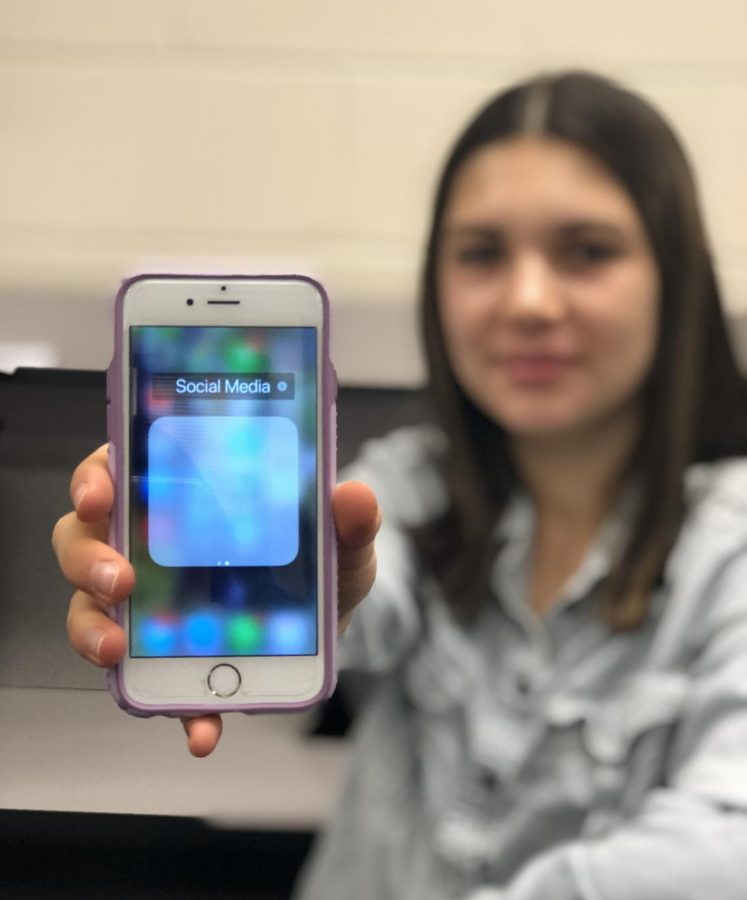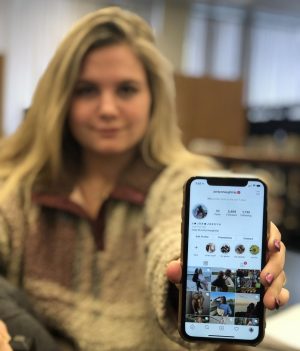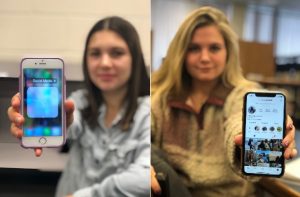Sallie Gutt, non-social media user, senior
Photo by Caroline Sun
Sallie Gutt, senior, holds up an empty social media folder. Rather than communicating via social media platforms, Gutt says she prefers to talk to others in person.
November 17, 2019
“I had Instagram and I did actually use it quite a bit,” Gutt said. “But I realized when I was using it that I was more concerned about the likes that I was getting on posts, or whether or not someone commented, or whether people thought what I was doing was cool. I was just getting really obsessive with it.”
In addition to the anxiety that came with using social media, Gutt says that another reason she stopped using social media was because she would rather have more in-depth conversations with people in real life.
“If you make a post of your family at Christmas time or something, your friend might comment on it, saying [something] like, oh, you look great and stuff,” Gutt said. “But if you were to talk to them face-to-face about how you spent time with your family on Christmas, they probably wouldn’t be telling you that you looked great. They’d probably be asking you about how your Christmas was, which they probably wouldn’t be doing in the comments section.
For Gutt, this problem is one of the main downfalls of social media. For her, the impersonality of social media generates a disconnect between people and their environment.
“Everybody is constantly on their phones, looking at posts, and they’re not really paying attention to what’s going on around them,” Gutt said. “I’m a very observant person, and I feel like a lot of people are missing things that are happening around them – interesting things that they can learn from – because of social media..”
This disconnect between people and their environment is only one of the problems Gutt sees with social media. Another concern that she has is for the problematic habits that social media platforms build within teenagers, such as over-sharing and judging based on first-impressions.
“The stereotypical impact [of social media] is seeing posts that are very unrealistic,” Gutt said. “For [horse] competitions, I’m seeing people younger than me competing at the highest levels and I feel bad sometimes, like “why can’t I do that?” But then with context, you realize it’s it’s because they have so much money and they can afford to train better or whatever the circumstances are, and that’s information you don’t get at first glance.”
However, even though Gutt currently stays away from social media, she admits there is a high possibility that she will return to platforms such as Instagram in the future. After all, she says that she often does feel like she is missing out on certain things, because “social media gives us so much insight into people’s lives, and if you don’t know that someone did something, then you can’t really ask about it.”
In addition, Gutt says that as a senior, social media will be the number one way to stay in contact with former classmates after graduation.
“Everyone’s graduating and going off to different places around the country, and there’s probably people you’re never going to see again, and that’s where I’m sure social media will come in, “ Gutt said. “It’ll be nice for people to connect and be able to see what everyone is doing and maybe at some point say, “ Hey, let’s get together and meet up again,” and that’s what social media should be for- bringing people together.”



